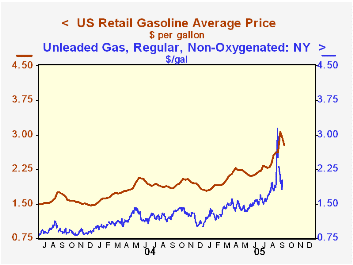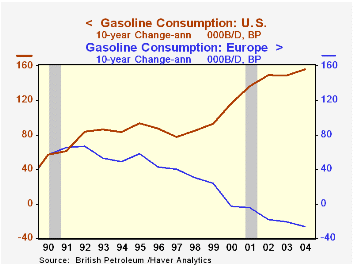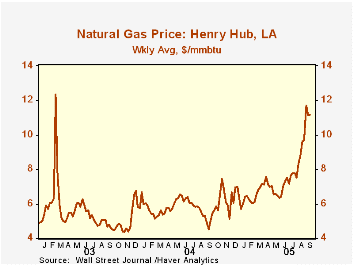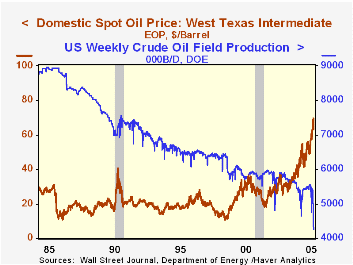 Global| Sep 20 2005
Global| Sep 20 2005Petroleum Prices: Supply Uncertainty & US Demand Strength
by:Tom Moeller
|in:Economy in Brief
Summary
Supply uncertainties have wreaked havoc on prices for crude oil and petroleum products. As of last week, the US average retail gasoline price fell to $2.79 per gallon, down from the weekly high of $3.07 set two weeks earlier and the [...]

Supply uncertainties have wreaked havoc on prices for crude oil and petroleum products. As of last week, the US average retail gasoline price fell to $2.79 per gallon, down from the weekly high of $3.07 set two weeks earlier and the NY harbor spot price for regular unleaded last Friday was down to $1.82 from a high of $3.13 just before Labor Day.
Demand strength, however, has left even these lower gasoline prices both up 40-50% versus the year ago levels.
Hurricane Katrina caused the initial anxiety over supply. Figures from the Oil & Gas Journal Weekly indicate that in the first two weeks of September, US refining production of gasoline was off 5% versus August. Some of that decline is seasonal, but the threat from Hurricane Rita yesterday caused the spot gasoline price to jump 10% d/d to $2.00 per gallon.
Alternatively, US gasoline demand has been consistent and strong. Through August demand was running 3-4% ahead of last year helped by a 1.5% y/y gain in the number of miles being driven. In September, demand is estimated to have fallen sharply, perhaps 10% m/m, in the wake of Hurricane Katrina, although the decline probably is temporary. Strong gasoline demand is a trademark of the United States. From 1994 to 2004, growth in US gasoline demand averaged 1.8% per year versus a 0.7% annual rate of decline in Europe during that ten year period. Some of that reflects differing economic fortunes, but ...
Wholesale natural gas prices at $11.17/mmbtu last week were more than double the prior year's level and very much reflect the recent supply dislocations. Regulation, however, has limited the price increase for residential gas as measured by the Consumer Price Index. For the first eight months of 2005 versus 2004, gas prices rose 11.5% while the gain in household electricity costs also was limited to 4.6%. Further gains are in store if yesterday's gas price rise over $12/mmbtu holds. (Many plants which generate electricity are fired by natural gas.)
Movement in crude oil prices has been similarly volatile with an upward bent. Yesterday's spot market price for West Texas Intermediate jumped 7% d/d to $67.40 though prices have eased a bit today. Under laying the strength has been a steady decline in US crude oil production, off 2.2% y/y through the first eight months of 2005 and off 38% versus twenty years ago.
For the latest Short Term Energy Outlook from the US Department of Energy click here.
Oil Prices and Consumer Spending from the Federal Reserve Bank of Richmond can be viewed here.
| Energy Prices | 09/19/05 | 12/31/04 | Y/Y | 2004 | 2003 | 2002 |
|---|---|---|---|---|---|---|
| US Retail Gasoline, Regular ($/Gal.) | $2.79 | $1.79 | 49.3% | $1.85 | $1.56 | $1.35 |
| Natural Gas, Henry Hub, LA ($/mmbtu) | $11.17 | $6.35 | 123.4% | $5.89 | $5.47 | $3.35 |
| Domestic Spot Market Price: West Texas Intermediate ($/Barrel) | $63.12 | $41.78 | 42.2% | $41.78 | $32.78 | $31.23 |
Tom Moeller
AuthorMore in Author Profile »Prior to joining Haver Analytics in 2000, Mr. Moeller worked as the Economist at Chancellor Capital Management from 1985 to 1999. There, he developed comprehensive economic forecasts and interpreted economic data for equity and fixed income portfolio managers. Also at Chancellor, Mr. Moeller worked as an equity analyst and was responsible for researching and rating companies in the economically sensitive automobile and housing industries for investment in Chancellor’s equity portfolio. Prior to joining Chancellor, Mr. Moeller was an Economist at Citibank from 1979 to 1984. He also analyzed pricing behavior in the metals industry for the Council on Wage and Price Stability in Washington, D.C. In 1999, Mr. Moeller received the award for most accurate forecast from the Forecasters' Club of New York. From 1990 to 1992 he was President of the New York Association for Business Economists. Mr. Moeller earned an M.B.A. in Finance from Fordham University, where he graduated in 1987. He holds a Bachelor of Arts in Economics from George Washington University.
More Economy in Brief
 Global| Feb 05 2026
Global| Feb 05 2026Charts of the Week: Balanced Policy, Resilient Data and AI Narratives
by:Andrew Cates






